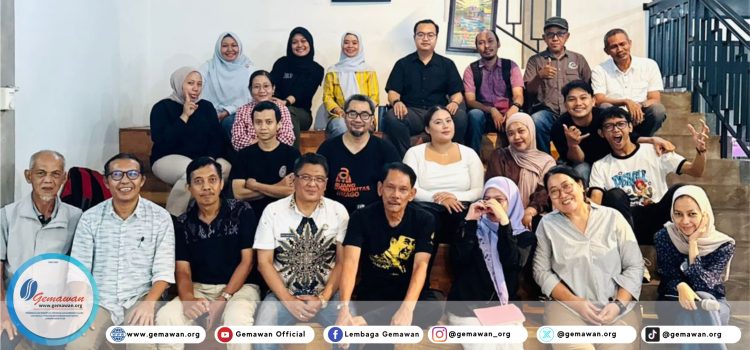
To deepen collective understanding of the complex dynamics surrounding mining in West Kalimantan, Gemawan held a discussion through its regular agenda series, G-TALKS (Gemawan Team Agenda, Learning, and Knowledge Sharing).
The session, titled “Mining in West Kalimantan: Between Growth, Ecological Degradation, and the People’s Fate?”, took place at Rumah Gesit Borneo on August 1, 2025.
The event brought together civil society representatives, academics, and environmental activists, featuring keynote speaker Dr. Abdul Harris Fahmi, M.T., Chair of the Indonesian Mining Experts Association (PERHAPI) for West Kalimantan. The discussion sought to explore the roots of mining-related problems, licensing policies, and the overlooked voices of local communities, while opening space for policy formulation grounded in ecological and social justice.
People’s Mining and the Contradictions of Resource Wealth
West Kalimantan is known for its rich deposits of gold, coal, and nickel. Yet, the abundance of natural resources has not translated into improved welfare for local communities. Contradictions emerge as small-scale mining activities, often driven by survival needs, cause environmental degradation, land conflicts, and even criminalization of local miners.
A key issue remains illegal gold mining (Pertambangan Emas Tanpa Izin / PETI), which continues to be widely debated. While PETI is categorized as a legal violation, it has also become a lifeline for many rural communities.
Understanding the Local Context
In his opening remarks, Hermawansyah, a member of Gemawan’s Executive Board, emphasized that this discussion serves as a forum to understand the local context of people’s mining (pertambangan rakyat) more comprehensively.
“This activity is an effort to interpret and seek legal solutions for the contributions of small-scale miners without discrimination. Here, we can truly listen to the perspectives of civil society,” he said.
Hermawansyah also highlighted the weak implementation of existing regulations, particularly regarding the 10 Standard Operating Procedures (SOPs) for the establishment of People’s Mining Areas (WPR).
“The Provincial Government’s responsibility in this regard remains minimal. What’s needed is a conceptual and pro-people approach, so we don’t keep blaming those who are simply struggling to survive,” he asserted.
Balancing Growth and Environmental Capacity
Dr. Abdul Harris Fahmi, M.T., Chair of PERHAPI West Kalimantan, emphasized that economic growth in the mining sector often overlooks environmental capacity.
“If we pursue economic growth without considering environmental carrying and absorption capacity, we are building a fragile future. When we talk about mining legality, there is no such thing as a ‘green mining company’—only changes in environmental function,” he said firmly.
Toward Policy and Advocacy for Justice
The discussion became a collective reflection space for civil society organizations (CSOs) to formulate strategic steps forward, including the preparation of a policy brief to be submitted to both local and national governments.
The forum reaffirmed that mining governance must be approached not only as an economic issue, but also as a matter of justice, survival, and ecological balance.
Authors: Feby Kartikasari & Ersa Dwiyana, Gemawan Activists
